- Home
- Neil Gaiman
Neil Gaiman Young Readers' Collection Page 19
Neil Gaiman Young Readers' Collection Read online
Page 19
“Oh.” Bod thought for a moment. “Where’s his grave?”
Caius pointed up the hill.
“He’s up at the top,” said Bod.
Caius shook his head.
“Then what?”
The old Roman reached down and he ruffled Bod’s hair. “In the hill,” he said. “Inside it. I was first brought here by my friends, followed in their turn by the local officials and the mimes, who wore the wax faces of my wife, taken by a fever in Camulodonum, and my father, killed in a border skirmish in Gaul. Three hundred years after my death a farmer, seeking a new place to graze his sheep, discovered the boulder that covered the entrance, and rolled it away, and went down, thinking there might be treasure. He came out a little later, his dark hair now as white as mine…”
“What did he see?”
Caius said nothing, then, “He would not speak of it. Or ever return. They put the boulder back, and in time, they forgot. And then, two hundred years ago, when they were building the Frobisher vault, they found it once more. The young man who found the place dreamed of riches, so he told no one, and he hid the doorway behind Ephraim Pettyfer’s casket, and went down one night, unobserved, or so he thought.”
“Was his hair white when he came up?”
“He did not come up.”
“Um. Oh. So, who is buried down there?”
Caius shook his head. “I do not know, young Owens. But I felt him, back when this place was empty. I could feel something waiting even then, deep in the hill.”
“What was he waiting for?”
“All I could feel,” said Caius Pompeius, “was the waiting.”
Scarlett was carrying a large picture book, and she sat next to her mother on the green bench near the gates, and she read her book while her mother inspected an educational supplement. She enjoyed the spring sunshine and she did her best to ignore the small boy who waved at her first from behind an ivy-covered monument, then, when she had resolved to no longer look at the monument, the boy popped up—literally, like a jack-in-a-box—from behind a tombstone (Joji G. Shoji, d. 1921, I was a stranger and you took me in). He gestured towards her, frantically. She ignored him.
Eventually she put her book down on the bench.
“Mummy? I’m going for a walk, now.”
“Stay on the path, dear.”
She stayed on the path until she was round the corner, and she could see Bod waving at her from further up the hill. She made a face at him.
“I’ve found things out,” said Scarlett.
“Me too,” said Bod.
“There were people before the Romans,” she said. “Way back. They lived, I mean, when they died they put them underground in these hills, with treasure and stuff. And they were called barrows.”
“Oh. Right,” said Bod. “That explains it. Do you want to come and see one?”
“Now?” Scarlett looked doubtful. “You don’t really know where one is, do you? And you know I can’t always follow you where you go.” She had seen him slip through walls, like a shadow.
In reply, he held up a large, rusted, iron key. “This was in the chapel,” he said. “It should open most of the gates up there. They used the same key for all of them. It was less work.”
She scrambled up the hillside beside him.
“You’re telling the truth?”
He nodded, a pleased smile dancing at the corners of his lips. “Come on,” he said.
It was a perfect spring day, and the air was alive with birdsong and bee hum. The daffodils bustled in the breeze and here and there on the side of the hill a few early tulips nodded. A blue powdering of forget-me-nots and fine, fat yellow primroses punctuated the green of the slope as the two children walked up the hill toward the Frobishers’ little mausoleum.
It was old and simple in design, a small, forgotten stone house with a metal gate for a door. Bod unlocked the gate with his key, and they went in.
“It’s a hole,” said Bod. “Or a door. Behind one of the coffins.”
They found it behind a coffin on the bottom shelf—a simple crawl space. “Down there,” said Bod. “We go down there.”
Scarlett found herself suddenly enjoying the adventure rather less. She said, “We can’t see down there. It’s dark.”
“I don’t need light,” said Bod. “Not while I’m in the graveyard.”
“I do,” said Scarlett. “It’s dark.”
Bod thought about the reassuring things that he could say, like “there’s nothing bad down there,” but the tales of hair turning white and people never returning meant that he could not have said them with a clear conscience, so he said, “I’ll go down. You wait for me up here.”
Scarlett frowned. “You shouldn’t leave me,” she said.
“I’ll go down,” said Bod, “and I’ll see who’s there, and I’ll come back and tell you all about it.”
He turned to the opening, bent down, and clambered through on his hands and knees. He was in a space big enough to stand up in, and he could see steps cut into the stone. “I’m going down the steps now,” he said.
“Do they go down a long way?”
“I think so.”
“If you held my hand and told me where I was walking,” she said, “then I could come with you. If you make sure I’m okay.”
“Of course,” said Bod, and before he had finished speaking the girl was coming through the hole on her hands and her knees.
“You can stand up,” Bod told her. He took her hand. “The steps are just here. If you put a foot forward you can find it. There. Now I’ll go first.”
“Can you really see?” she asked.
“It’s dark,” said Bod. “But I can see.”
He began to lead Scarlett down the steps, deep into the hill, and to describe what he saw to her as they went. “It’s steps down,” he said. “Made of stone. And there’s stone all above us. Someone’s made a painting on the wall.”
“What kind of painting?”
“A big hairy C is for Cow, I think. With horns. Then something that’s more like a pattern, like a big knot. It’s sort of carved in the stone too, not just painted, see?” and he took her fingers and placed them onto the carved knot-work.
“I can feel it!” she said.
“Now the steps are getting bigger. We are coming out into some kind of big room, now, but the steps are still going. Don’t move. Okay, now I am between you and the room. Keep your left hand on the wall.”
They kept going down. “One more step and we are on the rock floor,” said Bod. “It’s a bit uneven.”
The room was small. There was a slab of stone on the ground, and a low ledge in one corner, with some small objects on it. There were bones on the ground, very old bones indeed, although below where the steps entered the room Bod could see a crumpled corpse, dressed in the remains of a long brown coat—the young man who had dreamed of riches, Bod decided. He must have slipped and fallen in the dark.
The noise began all about them, a rustling slither, like a snake twining through dry leaves. Scarlett’s grip on Bod’s hand was harder.
“What’s that? Do you see anything?”
“No.”
Scarlett made a noise that was half gasp and half wail, and Bod saw something, and he knew without asking that she could see it too.
There was a light at the end of the room, and in the light a man came walking, walking through the rock, and Bod heard Scarlett choking back a scream.
The man looked well-preserved, but still like something that had been dead for a long while. His skin was painted (Bod thought) or tattooed (Scarlett thought) with purple designs and patterns. Around his neck hung a necklace of sharp, long teeth.
“I am the master of this place!” said the figure, in words so ancient and gutteral that they were scarcely words at all. “I guard this place from all who would harm it!”
His eyes were huge in his head. Bod realized it was because he had circles drawn around them in purple, making his face look like an owl’s.
“Who are you?” asked Bod. He squeezed Scarlett’s hand as he said it.
The Indigo Man did not seem to have heard the question. He looked at them fiercely.
“Leave this place!” he said in words that Bod heard in his head, words that were also a gutteral growl.
“Is he going to hurt us?” asked Scarlett.
“I don’t think so,” said Bod. Then, to the Indigo Man, he said, as he had been taught, “I have the Freedom of the Graveyard and I may walk where I choose.”
There was no reaction to this by the Indigo Man, which puzzled Bod even more because even the most irritable inhabitants of the graveyard had been calmed by this statement. Bod said, “Scarlett, can you see him?”
“Of course I can see him. He’s a big scary tattooey man and he wants to kill us. Bod, make him go away!”
Bod looked at the remains of the gentleman in the brown coat. There was a lamp beside him, broken on the rocky floor. “He ran away,” said Bod aloud. “He ran because he was scared. And he slipped or he tripped on the stairs and he fell off.”
“Who did?”
“The man on the floor.”
Scarlett sounded irritated now, as well as puzzled and scared. “What man on the floor? It’s too dark. The only man I can see is the tattooey man.”
And then, as if to make quite sure that they knew that he was there, the Indigo Man threw back his head and let out a series of yodeling screams, a full-throated ululation that made Scarlett grip Bod’s hand so tightly that her fingernails pressed into his flesh.
Bod was no longer scared, though.
“I’m sorry I said they were imaginary,” said Scarlett. “I believe now. They’re real.”
The Indigo Man raised something over his head. It looked like a sharp stone blade. “All who invade this place will die!” he shouted, in his gutteral speech. Bod thought about the man whose hair had turned white after he had discovered the chamber, how he would never return to the graveyard or speak of what he had seen.
“No,” said Bod. “I think you’re right. I think this one is.”
“Is what?”
“Imaginary.”
“Don’t be stupid,” said Scarlett. “I can see it.”
“Yes,” said Bod. “And you can’t see dead people.” He looked around the chamber. “You can stop now,” he said. “We know it’s not real.”
“I will feast on your liver!” screamed the Indigo Man.
“No, you won’t,” said Scarlett, with a huge sigh. “Bod’s right.” Then she said, “I think maybe it’s a scarecrow.”
“What’s a scarecrow?” asked Bod.
“It’s a thing farmers put in fields to scare crows.”
“Why would they do that?” Bod quite liked crows. He thought they were funny, and he liked the way they helped to keep the graveyard tidy.
“I don’t know exactly. I’ll ask Mummy. But I saw one from a train and I asked what it was. Crows think it’s a real person. It’s just a made-up thing, that looks like a person, but it’s not. It’s just to scare the crows away.”
Bod looked around the chamber. He said, “Whoever you are, it isn’t working. It doesn’t scare us. We know it isn’t real. Just stop.”
The Indigo Man stopped. It walked over to the rock slab and it lay down on it. Then it was gone.
For Scarlett the chamber was once more swallowed by the darkness. But in the darkness, she could hear the twining sound again, getting louder and louder, as if something were circling the round room.
Something said, WE ARE THE SLEER.
The hairs on the back of Bod’s neck began to prickle. The voice in his head was something very old and very dry, like the scraping of a dead twig against the window of the chapel, and it seemed to Bod that there was more than one voice there, that they were talking in unison.
“Did you hear that?” he asked Scarlett.
“I didn’t hear anything, just a slithery noise. It made me feel strange. All prickly in my tummy. Like something horrible is going to happen.”
“Nothing horrible is going to happen,” said Bod. Then, to the chamber, he said, “What are you?”
WE ARE THE SLEER. WE GUARD AND WE PROTECT.
“What do you protect?”
THE RESTING PLACE OF THE MASTER. THIS IS THE HOLIEST OF ALL HOLY PLACES, AND IT IS GUARDED BY THE SLEER. “You can’t touch us,” said Bod. “All you can do is scare.”
The twining voices sounded petulant. FEAR IS A WEAPON OF THE SLEER.
Bod looked down at the ledge. “Are those the treasures of your master? An old brooch, a cup, and a little stone knife? They don’t look like much.”
THE SLEER GUARDS THE TREASURES. THE BROOCH, THE GOBLET, THE KNIFE. WE GUARD THEM FOR THE MASTER, WHEN HE RETURNS. IT COMES BACK. IT ALWAYS COMES BACK. “How many of you are there?”
But the Sleer said nothing. The inside of Bod’s head felt as if it were filled with cobwebs, and he shook it, trying to clear it. Then he squeezed Scarlett’s hand. “We should go,” he said.
He led her past the dead man in the brown coat—and honestly, thought Bod, if he hadn’t got scared and fallen the man would have been disappointed in his hunt for treasure. The treasures of ten thousand years ago were not the treasures of today. Bod led Scarlett carefully up the steps, through the hill, into the jutting black masonry of the Frobisher mausoleum.
Late spring sunlight shone through the breaks in the masonry and through the barred door, shocking in its brightness, and Scarlett blinked and covered her eyes at the suddenness of the glare. Birds sang in the bushes, a bumblebee droned past, everything was surprising in its normality.
Bod pushed open the mausoleum door, and then locked it again behind them.
Scarlett’s bright clothes were covered in grime and cobwebs, and her dark face and hands were pale with dust.
Further down the hill somebody—quite a few some-bodies—was shouting. Shouting loudly. Shouting frantically.
Someone called, “Scarlett? Scarlett Perkins?” and Scarlett said “Yes? Hello?” and before she and Bod had a chance to discuss what they had seen, or to talk about the Indigo Man, there was a woman in a fluorescent yellow jacket with POLICE on the back demanding to know if she was okay, and where she had been, and if someone had tried to kidnap her, and then the woman was talking on a radio, letting them know that the child had been found.
Bod slipped along beside them as they walked down the hill. The door to the chapel was open, and inside both of Scarlett’s parents were waiting, her mother in tears, her father worriedly talking to people on a mobile phone, along with another policewoman. No one saw Bod as he waited in the corner.
The people kept asking Scarlett what had happened to her, and she answered, as honestly as she could, told them about a boy called Nobody who took her deep inside a hill where a purple tattoo man appeared in the dark, but he was really a scarecrow. They gave her a chocolate bar and they wiped her face and asked if the tattooed man had ridden a motorbike, and Scarlett’s mother and father, now that they were relieved and not afraid for her any longer were angry with themselves and with her, and they told each other that it was the other one’s fault for letting their little girl play in a cemetery, even if it was a nature reserve, and that the world was a very dangerous place these days, and if you didn’t keep your eyes on your children every second you could not imagine what awful things they would be plunged into. Especially a child like Scarlett.
Scarlett’s mother began sobbing, which made Scarlett cry, and one of the policewomen got into an argument with Scarlett’s father, who tried to tell her that he, as a taxpayer, paid her wages, and she told him that she was a taxpayer too and probably paid his wages, while Bod sat in the shadows in the corner of the chapel, unseen by anyone, not even Scarlett, and watched and listened until he could take no more.
It was twilight in the graveyard by now, and Silas came and found Bod, up near the amphitheater, looking out over the town. He stood beside the boy and he said nothing, which was his way.<
br />
“It wasn’t her fault,” said Bod. “It was mine. And now she’s in trouble.”
“Where did you take her?” asked Silas.
“Into the middle of the hill, to see the oldest grave. Only there isn’t anybody in there. Just a snaky thing called a Sleer who scares people.”
“Fascinating.”
They walked back down the hill together, watched as the old chapel was locked up once more and the police and Scarlett and her parents went off into the night.
“Miss Borrows will teach you joined-up letters,” said Silas. “Have you read The Cat in the Hat yet?”
“Yes,” said Bod. “Ages ago. Can you bring me more books?”
“I expect so,” said Silas.
“Do you think I’ll ever see her again?”
“The girl? I very much doubt it.”
But Silas was wrong. Three weeks later, on a grey afternoon, Scarlett came to the graveyard, accompanied by both her parents.
They insisted that she remain in sight at all times, although they trailed a little behind her. Scarlett’s mother occasionally exclaimed about how morbid this all was and how fine and good it was that they would soon be leaving it behind forever.
When Scarlett’s parents began to talk to each other, Bod said, “Hello.”
“Hi,” said Scarlett, very quietly.
“I didn’t think I’d see you again.”
“I told them I wouldn’t go with them unless they brought me back here one last time.”
“Go where?”
“Scotland. There’s a university there. For Dad to teach particle physics.”
They walked on the path together, a small girl in a bright orange anorak and a small boy in a grey winding sheet.
“Is Scotland a long way away?”
“Yes,” she said.
“Oh.”
“I hoped you’d be here. To say good-bye.”
“I’m always here.”
“But you aren’t dead, are you, Nobody Owens?”
“’Course not.”
“Well, you can’t stay here all your life. Can you? One day you’ll grow up and then you will have to go and live in the world outside.”
He shook his head. “It’s not safe for me out there.”

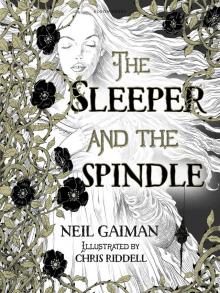 The Sleeper and the Spindle
The Sleeper and the Spindle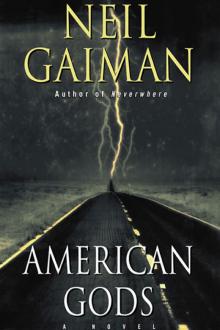 American Gods
American Gods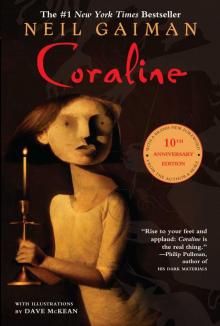 Coraline
Coraline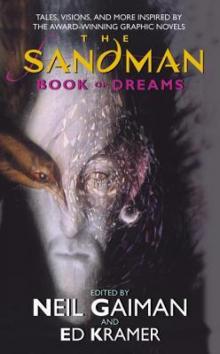 The Sandman: Book of Dreams
The Sandman: Book of Dreams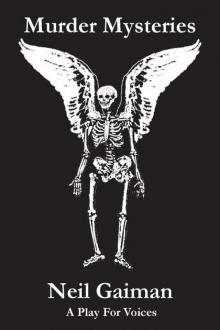 Murder Mysteries
Murder Mysteries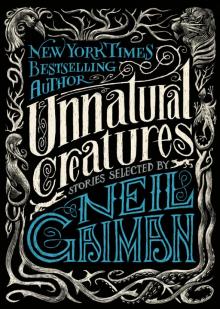 Unnatural Creatures
Unnatural Creatures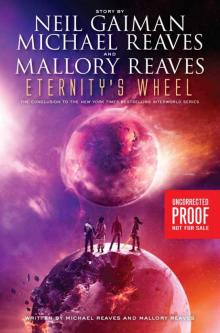 Eternity's Wheel
Eternity's Wheel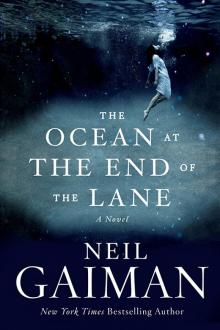 The Ocean at the End of the Lane
The Ocean at the End of the Lane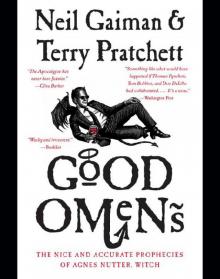 Good Omens
Good Omens Stardust
Stardust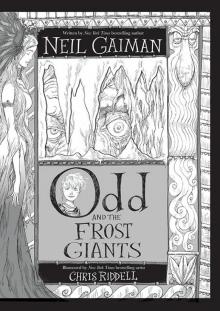 Odd and the Frost Giants
Odd and the Frost Giants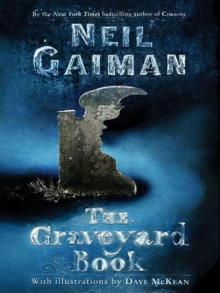 The Graveyard Book
The Graveyard Book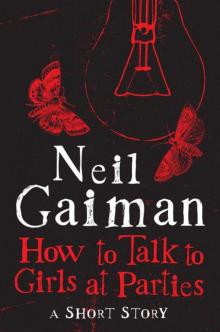 How to Talk to Girls at Parties
How to Talk to Girls at Parties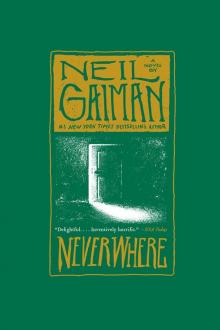 Neverwhere
Neverwhere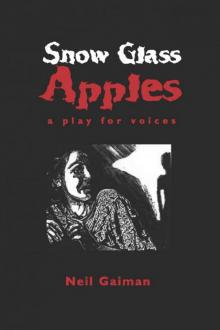 Snow, Glass, Apples
Snow, Glass, Apples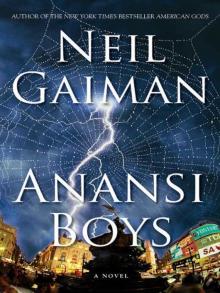 Anansi Boys
Anansi Boys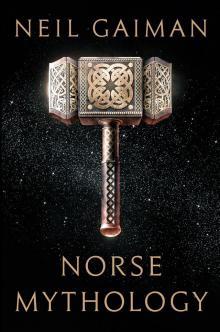 Norse Mythology
Norse Mythology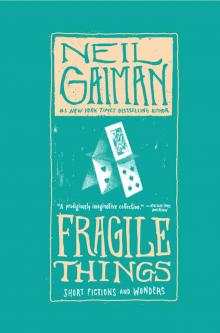 Fragile Things: Short Fictions and Wonders
Fragile Things: Short Fictions and Wonders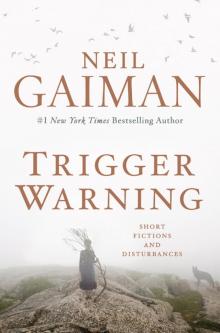 Trigger Warning: Short Fictions and Disturbances
Trigger Warning: Short Fictions and Disturbances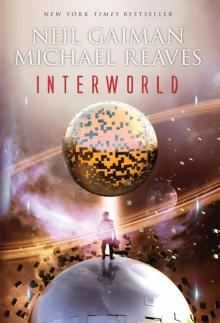 InterWorld
InterWorld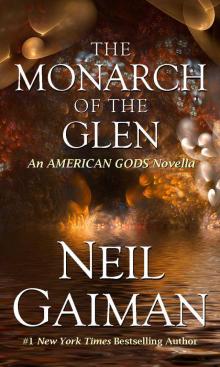 The Monarch of the Glen
The Monarch of the Glen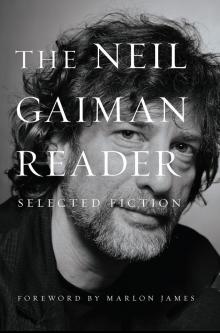 The Neil Gaiman Reader
The Neil Gaiman Reader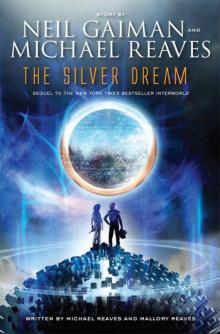 The Silver Dream
The Silver Dream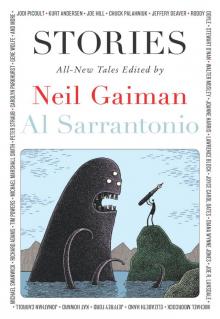 Stories
Stories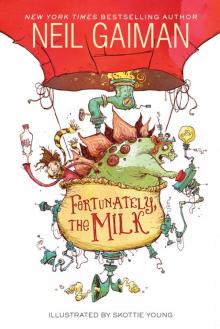 Fortunately, the Milk
Fortunately, the Milk Art Matters
Art Matters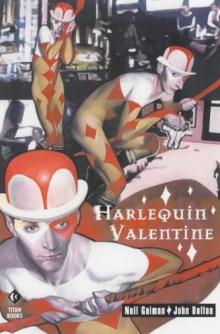 Harlequin Valentine
Harlequin Valentine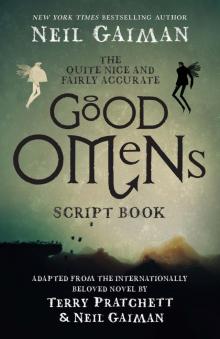 The Quite Nice and Fairly Accurate Good Omens Script Book
The Quite Nice and Fairly Accurate Good Omens Script Book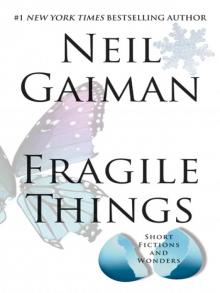 Fragile Things
Fragile Things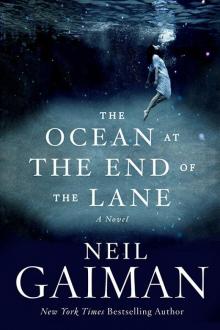 The Ocean at the End of the Lane: A Novel
The Ocean at the End of the Lane: A Novel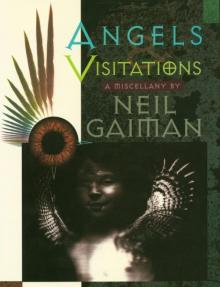 Angels and Visitations
Angels and Visitations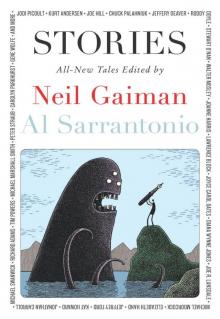 Stories: All-New Tales ngss-1
Stories: All-New Tales ngss-1 Don't Panic
Don't Panic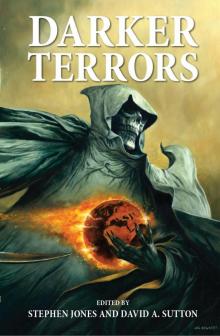 Darker Terrors
Darker Terrors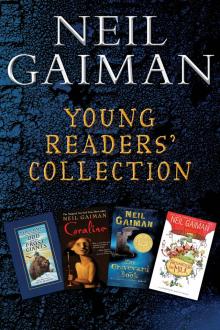 Neil Gaiman Young Readers' Collection
Neil Gaiman Young Readers' Collection A Study In Emerald
A Study In Emerald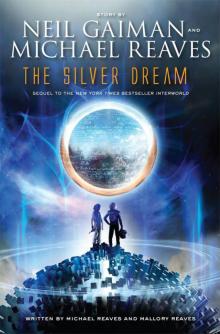 The Silver Dream: An InterWorld Novel
The Silver Dream: An InterWorld Novel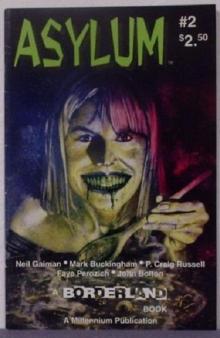 Feeders and Eaters
Feeders and Eaters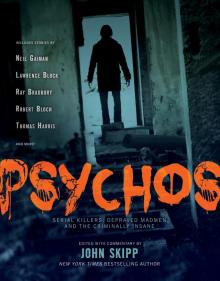 Psychos
Psychos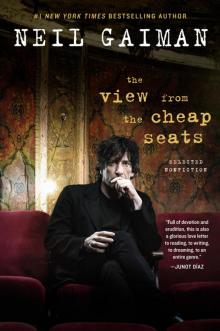 The View from the Cheap Seats
The View from the Cheap Seats Trigger Warning
Trigger Warning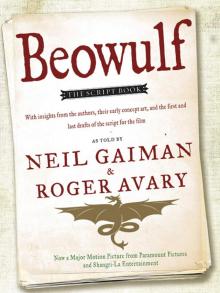 Beowulf
Beowulf Nessun Dove
Nessun Dove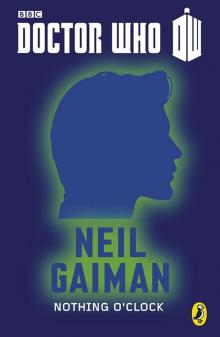 Doctor Who: Nothing O'Clock: Eleventh Doctor: 50th Anniversary
Doctor Who: Nothing O'Clock: Eleventh Doctor: 50th Anniversary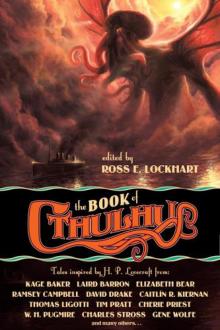 The Book of Cthulhu
The Book of Cthulhu